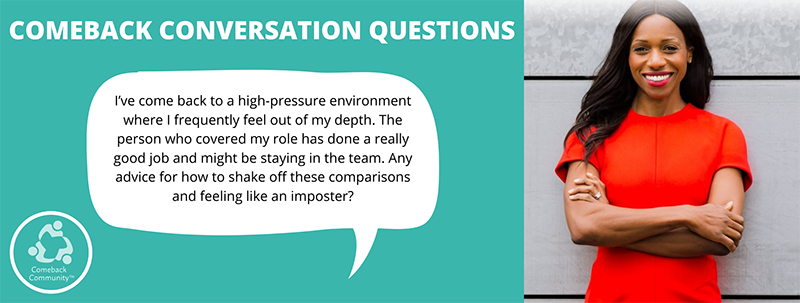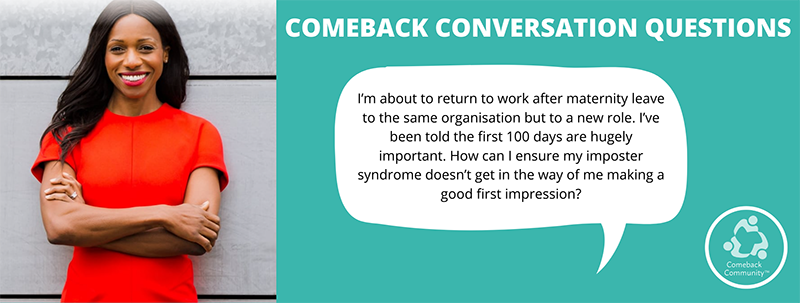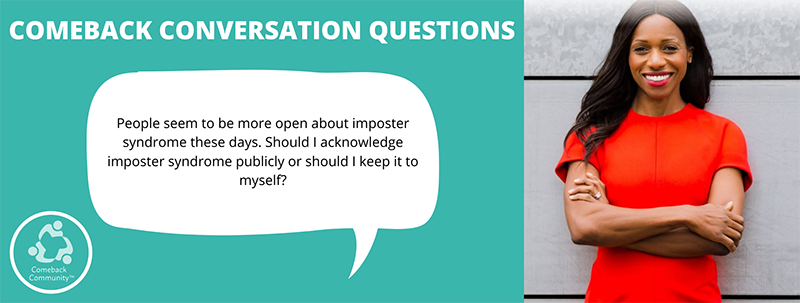Comeback Conversation
Comeback Conversation – Imposter Syndrome with Caroline Flanagan
Caroline Flanagan, author of Baby Proof Your Career and Be The First: Imposter Syndrome, People of Colour and the Struggle to Succeed in a White World was our guest at our first Comeback Conversation event. Together with Jessica Chivers, coaching psychologist, author of Mothers Work! and developer of Comeback Community they tackled participants’ challenges on imposter feelings.
Here we share Caroline & Jessica’s responses to three questions asked in the session.
About Caroline
Caroline is an ex-lawyer who spent nine years in the City at an American law firm before leaving to train as a coach. She says she suffered from imposter syndrome that whole time but had no idea. “I had never come across it in high-performing environments, it was almost a taboo subject.” She says she feels like an I feel like an imposter every day.
“Imposter syndrome is a subject close to my heart. I feel I live and breathe and sleep it. Not just because it’s key area of my work but because I’ve been an imposter my whole life.”
Set yourself up for a confident comeback before you leave
When working with coachees before they go on leave, we often invite them to write a letter to themselves or make a video which they can play before they go back to work which covers four things:
- What have I worked on this year?
- What am I proud of?
- What are other people telling me I’ve done well?
- What I am looking forward to about coming back to work?
This captures your energy and positivity and your achievements. Play it before you return to work and look at the person you were.
Corinne’s Question
I’ve come back to a high-pressure environment where I frequently feel out of my depth. The person who covered my role has done a really good job and might be staying in the team. Any advice for how to shake off these comparisons and feeling like an imposter?
- “I’m an imposter is a very important statement because what I’m doing is accepting the way I feel in a particular situation.” It’s important because you’re not constantly telling yourself I shouldn’t be feeling this way and getting caught up in the ‘thought drama’ around who you think you are and who you should be and who somebody else is.
- Acknowledge your feelings, accept you feel like an imposter. You are in a new situation but there’s a lot of energy in that if you know where to channel it.
- Imposter syndrome can be a big source of energy – if untamed, it will have us spiralling out of control and filled with self-doubt but if we can channel it into something positive (e.g. by thinking about what you want to be bringing on your return and how you want to be showing up)
- Focus on your value – what new perspectives do you have that others don’t have? And what were you bringing to the role before you went on leave?
- Don’t ask yourself not to compare – instead validate those feelings and channel the energy from them.
- Make yourself write a list – what do I have? Coming up with this list can make you feel much more confident and courageous going back into that role.
- Go into listening mode – start having lots of conversations with people, find out what’s going on. Don’t put yourself under pressure to have lots of answers and to be able to add value immediately. Just listen and get your bearings.
Sarah’s Question
I’m about to return to work after maternity leave to the same organisation but to a new role. I’ve been told the first 100 days are hugely important. How can I ensure my imposter syndrome doesn’t get in the way of me making a good first impression?
- Knowing your objective(s) are for those first 100 days is key. This will make it easier to perform and to have the help and support we need.
- Ask yourself what you want to achieve in those 100 days. What do I want to feel during that time of going back to work? Having some objectives will keep you grounded and better able to focus. It gives you direction.
- Number one focus should be relationships – getting to know people again, getting to know the environment again. Put your energy into that. Seeing what’s changed and where are the new opportunities.
- Focussing on what we can learn and how we can connect with other people takes the spotlight off us and gets us out of our own heads.
- It’s also important that you observe how your own mind works – validate your feelings by writing them down and come back to them later. This frees you up to go to work and be yourself. This is a good tool to help stop the imposter feelings coming in when you want to create a good impression – put the feelings down on paper and come back to them later.
- Think about 5 words you would like a colleague to use to say about you 3 months down the line. Use those words to think about how you will show up in 1-1’s, in team meetings, in electronic communications. It simplifies and guides what we say and what we disclose. It’s a useful way to think about how you want to show up. Write down these 5 words and use them as an anchor for what you want to achieve.
Ashmi’s Question
People seem to be more open about imposter syndrome these days. Should I acknowledge imposter syndrome publicly or should I keep it to myself?
- The most important question and the most helpful guide is to ask yourself “what is my reason for sharing?”
- What are the right context and frames for sharing? In a review meeting where you are getting some feedback/if you are asked why you didn’t step up for a role/why something wasn’t handed in on time – why are you being a perfectionist?
- Making tasks perfect is driven by imposter syndrome to show you’re good enough. When this comes up (from a boss or a colleague) you might say “I’m working on this and I recognise this as a symptom of imposter syndrome – I don’t know if you have ever come across it but if you’ve got any advice that could help me to get better at that, I would welcome it.”
- In a review situation where you are talking about career goals, you can be open and say you feel like an imposter from being out of the loop for a little while. Letting people know you recognise that in yourself and you hope that with time, it will get better.
- Being strategic about sharing. The one caveat is being in a senior/HR role where showing that you have imposter syndrome is enormously important for how you support other people who have it too. The more successful you are, the more important it is to be authentic in your success and talk about the fact that it hasn’t always been easy, and you are not alone. Sharing in order to be inspirational and authentic for others is a great reason to share.
- When you are coming back from maternity or another long leave, you’ve got an opportunity. You come back with a fresh perspective, and that’s a strength.
And finally…what’s the difference between self-doubt or negative self-doubt and imposter syndrome?
- Caroline thinks it’s all fear based and comes from a fear about not wanting to fail.
- For me, with imposter syndrome, the more you achieve and the more you are praised, the worse it gets. Instead of reinforcing how great you are and making you feel better, positive validation makes you feel worse because you think you really are going to be found out.
- Contrast that with normal self-doubt where you get some positive feedback, and it gives you a boost. This keeps happening and gradually you acquire confidence in a particular area. The key difference is how you solve imposter syndrome is different to how you solve self-doubt.
- We can get caught up in identifying imposter syndrome. We are all different and so my imposter syndrome will be different to yours. Don’t get too caught up in whether you have real imposter syndrome or whether it is just negative self-talk. Focus instead on what will work for you and what you can try. Put your energy in the solution rather than the diagnosis.
We also answered these questions in the session:
- From an employer perspective, what can we do to help remove the feeling of imposter syndrome for people returning from leave?
- Any advice for the application process when you’ve been out of the loop for a while?
- I feel like I might be experiencing this whilst interviewing for jobs and I question whether I would actually be able to do the job I’m applying for even though I would be very capable?
- I’ve experienced other women not supporting our colleagues coming back from maternity and judging their commitment or efforts which exacerbates feeling like an imposter rather than sympathising that their life is different now and they have more to juggle. What would you suggest to help educate these flippant and uneducated attitudes?
RESOURCES JESSICA & CAROLINE RECOMMENDED
- Unstoppable People by Adrian Gilpin
- She’s Back by Lisa Unwin & Deb Kahn (for people who’ve taken a long career break)
- Playing Big by Tara Mohr








